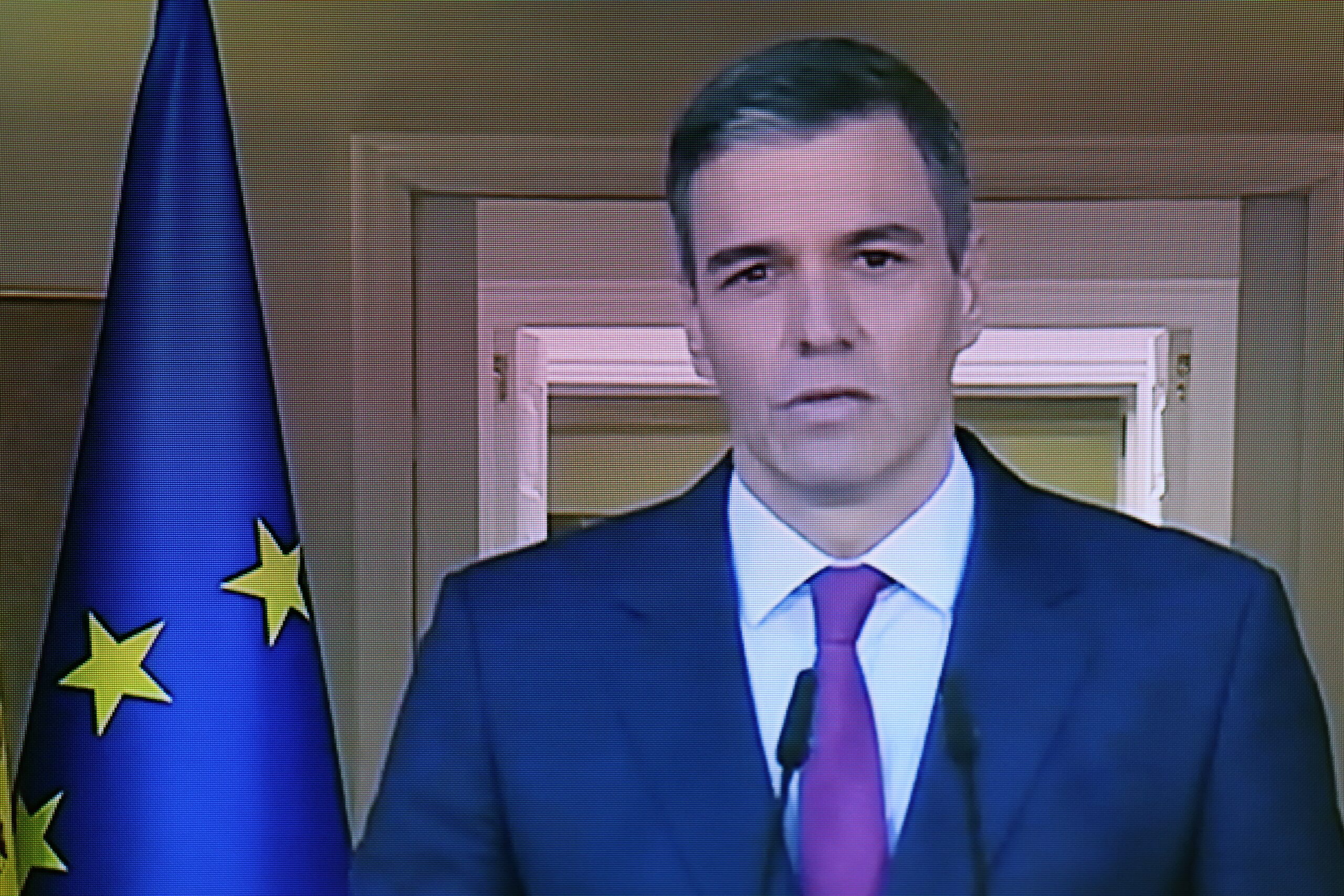Spain PM Sanchez walks back from resignation threat

A picture of a TV screen taken on April 29, 2024 in Madrid shows Spain Prime Minister Pedro Sanchez announcing that he stays as Prime Minister despite political harassment. Spain’s Pedro Sanchez said he would stay on as Prime Minister after threatening to stand down over what he has denounced as a campaign of political harassment by the right. (Photo by Thomas COEX / AFP)
MADRID — Spain’s Pedro Sanchez said Monday he would stay on as prime minister after threatening to stand down over what he denounced as a campaign of political harassment by the right.
“I have decided to stay,” the 52-year-old Socialist leader said in a highly-anticipated public address that drew a line under uncertainty that had gripped Spain for five days.
In office since 2018, Sanchez on Wednesday dropped a political bombshell saying he would consider resignation after a court confirmed a preliminary probe into his wife Begona Gomez for suspected influence peddling and corruption.
READ: Spain to recognize Palestinian statehood by July, leader says — reports
The complaint was triggered by an anti-graft NGO with ties to the far right. The right-wing opposition Popular Party (PP) also demanded answers.
Article continues after this advertisementSanchez’s response, outlined in a letter published on X, the former Twitter, immediately switched the focus onto toxic political practices targeting politicians’ families, and to Spain’s political future.
Article continues after this advertisementDenying his move was a “political calculation”, Sanchez called for a public reflection on a growing political polarisation which he said was increasingly being driven by “deliberate disinformation”.
“For too long we’ve let this filth corrupt our political and public life with toxic methods that were unimaginable just a few years ago… Do we really want this for Spain?” he asked.
His decision to stay, he said, was “decisively influenced” by the mass show of support on Saturday outside the Madrid headquarters of his Socialist party, where thousands of emotional supporters had chanted: “Pedro, stay!”
READ: Spain’s PM Sanchez to go on state visit to China
During an interview with Spanish public television on Monday night, Sanchez said his wife had also urged him not to resign.
He said the campaign of “misinformations” had sought to turn him into “public enemy number one”, and predicted it would “intensify”.
“They are not going to stop, I am very well aware of this,” he told the station, calling for “an end to insults in public life”.
‘Feigned resignation’
The court said it opened the probe over a complaint by anti-corruption group Manos Limpias (Clean Hands), whose secretary general Miguel Bernad is linked to the far right.
News of the probe was first published by El Confidencial which said it was linked to two meetings Gomez allegedly had with Spanish tourism group Globalia, which owns Air Europa, when the airline was seeking a huge bailout due to Covid, which it got several months later.
Shortly after Sanchez’s bombshell letter, Manos Limpias — which has presented a litany of unsuccessful lawsuits against politicians in the past — admitted its complaint was based on media reports whose veracity was unclear.
The public prosecutor’s office on Thursday asked that the investigation into Begona Gomez be closed
Monday’s announcement was welcomed with relief by Sanchez’s supporters but angrily derided by right-wing critics which dismissed his threat to quit as an attempt to rally his supporters.
With his “feigned resignation”, Sanchez had “made a fool of this nation of 48 million Spaniards,” said PP leader Alberto Nunez Feijoo, addressing what he referred to as an “outraged Spain”.
“The prime minister has chosen to carry on regardless rather than resign and take responsibility.. and tell the truth,” he said.
Isabel Diaz Ayuso, a PP hardliner who governs the Madrid region, said it was “almost a joke”, while Santiago Abascal who heads the far-right Vox denounced Sanchez over a “crude, outrageous piece of theatre” that had exposed Spain to “international disgrace of incalculable dimensions”.
Vilified by the right
Over the past six years, Sanchez has been vilified by right-wing opponents and media because his minority government relies on the support of the hard left and Catalan and Basque separatist parties to pass laws.
Recently, they have been particularly outraged by his decision to offer an amnesty to hundreds of Catalan separatists facing legal action over their role in the region’s failed 2017 independence bid.
That amnesty, which was offered in exchange for their support for Sanchez to secure a new term in office in November, still needs final parliamentary approval.
Sanchez did not specify on Monday how his government would fight misinformation and improve public debate.
Cristina Monge, a political scientist at the University of Zaragoza, said Sanchez needs to take concrete measures otherwise he would emerge weakened from this episode.
“If things stay as they are, if there’s nothing else, people won’t understand what’s happened and what’s at stake,” she told AFP.